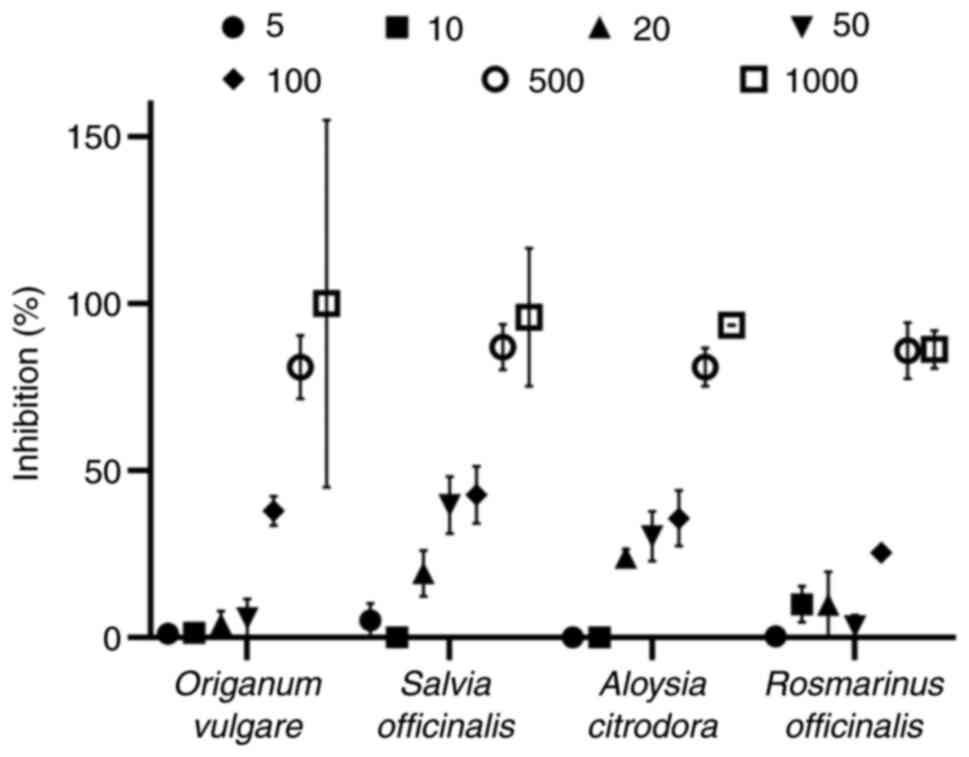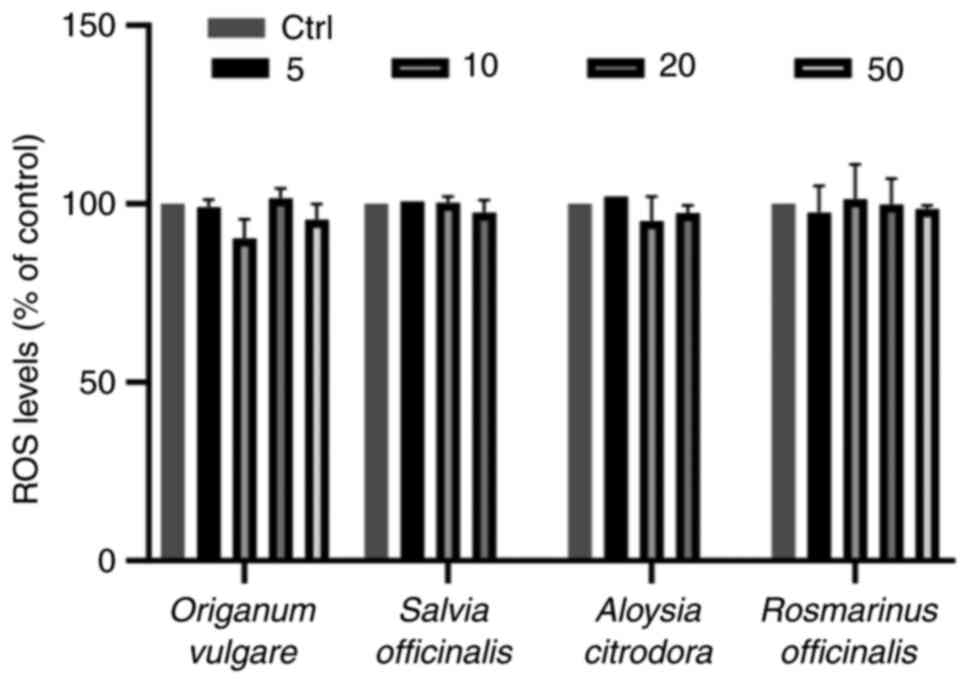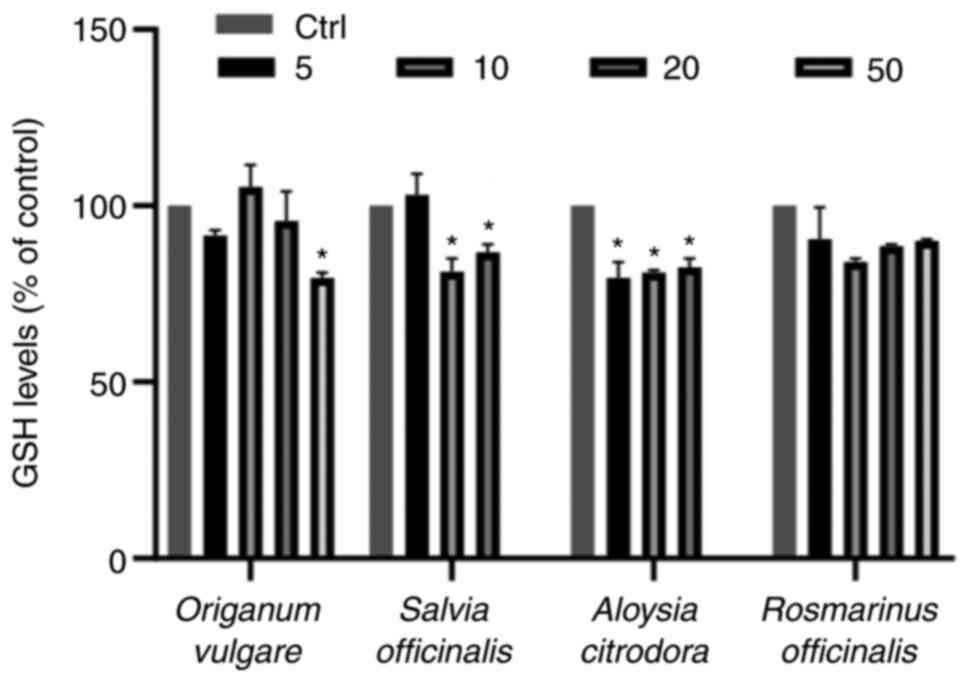|
1
|
GlobeNewswire by notified: Global
Medicinal Herbs Market Size, Trends, Company Profiles, Growth Rate,
Revenue, Demand and Forecast. GlobeNewswire, Inc., 2021. https://www.globenewswire.com/en/news-release/2021/02/16/2176036/0/en/Herbal-Medicine-Market-Global-Sales-Are-Expected-To-Reach-US-550-Billion-by-2030-as-stated-by-insightSLICE.html.
|
|
2
|
Joshi B, Sah GP, Basnet BB, Bhatt MR,
Sharma D, Subedi K, Pandey J and Malla R: Phytochemical extraction
and antimicrobial properties of different medicinal plants:
Ocimum sanctum (Tulsi), Eugenia caryophyllata
(Clove), Achyranthes bidentata (Datiwan) and Azadirachta
indica (Neem). J Microbiol Antimicrob. 3:1–7. 2011.
|
|
3
|
World Health Organization (WHO): WHO
Traditional Medicine Strategy: 2014-2023. WHO, Geneva, 2013.
https://apps.who.int/iris/handle/10665/92455.
|
|
4
|
Garg AK, Faheem M and Singh S: Role of
medicinal plant in human health disease. Asian J Plant Sci Res.
11:19–21. 2021.
|
|
5
|
Galloway WRJD, Isidro-Llobet A and Spring
DR: Diversity-oriented synthesis as a tool for the discovery of
novel biologically active small molecules. Nat Commun.
1(80)2010.PubMed/NCBI View Article : Google Scholar
|
|
6
|
Hopkins AL, Mason JS and Overington JP:
Can we rationally design promiscuous drugs? Curr Opin Struct Biol.
16:127–136. 2006.PubMed/NCBI View Article : Google Scholar
|
|
7
|
Ekor M: The growing use of herbal
medicines: Issues relating to adverse reactions and challenges in
monitoring safety. Front Pharmacol. 4(177)2014.PubMed/NCBI View Article : Google Scholar
|
|
8
|
Sindhi V, Gupta V, Sharma K, Bhatnagar S,
Kumari R and Dhaka N: Potential applications of antioxidants-A
review. J Pharm Res. 7:828–835. 2013.
|
|
9
|
Kebede M and Admassu S: Application of
antioxidants in food processing industry: Options to improve the
extraction yields and market value of natural products. Adv Food
Technol Nutr Sci Open J. 5:38–49. 2019.
|
|
10
|
Taghvaei M and Jafari S: Application and
stability of natural antioxidants in edible oils in order to
substitute synthetic additives. J Food Sci Technol. 52:1272–1282.
2015.PubMed/NCBI View Article : Google Scholar
|
|
11
|
Augustyniak A, Bartosz G, Cipak A, Duburs
G, Horáková L, Luczaj W, Majekova M, Odysseos AD, Rackova L,
Skrzydlewska E, et al: Natural and synthetic antioxidants: An
updated overview. Free Radic Res. 44:1216–1262. 2010.PubMed/NCBI View Article : Google Scholar
|
|
12
|
Mattson MP: Dietary factors, hormesis and
health. Ageing Res Rev. 7:43–48. 2008.PubMed/NCBI View Article : Google Scholar
|
|
13
|
Mossa ATH and Nawwar GAM: Free radical
scavenging and antiacetylcholinesterase activities of Origanum
majorana L. essential oil. Hum Exp Toxicol. 30:1501–1513.
2011.PubMed/NCBI View Article : Google Scholar
|
|
14
|
Veskoukis A, Kerasioti E, Priftis A, Kouka
P, Spanidis Y, Makri S and Kouretas D: A battery of translational
biomarkers for the assessment of the in vitro and in vivo
antioxidant action of plant polyphenolic compounds: The biomarker
issue. Curr Opin Toxicol. 13:99–109. 2019.
|
|
15
|
Kyriazis I, Skaperda Z, Tekos F, Makri S,
Vardakas P, Vassi E, Patouna A, Terizi K, Angelakis C and Kouretas
D: Methodology for the biofunctional assessment of honey (Review).
Int J Funct Nutr. 2:2634–7989. 2021.
|
|
16
|
Brand-Williams W, Cuvelier ME and Berset
C: Use of a free radical method to evaluate antioxidant activity.
LWT-Food Sci Technol. 28:25–30. 1995.
|
|
17
|
Kouka P, Priftis A, Stagos D, Angelis A,
Stathopoulos P, Xinos N, Skaltsounis AL, Mamoulakis C, Tsatsakis
AM, Spandidos DA and Kouretas D: Assessment of the antioxidant
activity of an olive oil total polyphenolic fraction and
hydroxytyrosol from a Greek Olea europea variety in endothelial
cells and myoblasts. Int J Mol Med. 40:703–712. 2017.PubMed/NCBI View Article : Google Scholar
|
|
18
|
Cano A: An end-point method for estimation
of the total antioxidant activity in plant material. Phytochem
Anal. 9:196–202. 1998.
|
|
19
|
Vardakas P, Skaperda Z, Tekos F, Trompeta
AF, Tsatsakis A, Charitidis CA and Kouretas D: An integrated
approach for assessing the in vitro and in vivo redox-related
effects of nanomaterials. Environ Res. 197(111083)2021.PubMed/NCBI View Article : Google Scholar
|
|
20
|
Gülçin I, Küfrevioǧlu ÖI, Oktay M and
Büyükokuroǧlu ME: Antioxidant, antimicrobial, antiulcer and
analgesic activities of nettle (Urtica dioica L.). J
Ethnopharmacol. 90:205–215. 2004.PubMed/NCBI View Article : Google Scholar
|
|
21
|
Yen GC and Duh PD: Antioxidative
properties of methanolic extracts from peanut hulls. J Am Oil Chem
Soc. 70:383–386. 1993.
|
|
22
|
Hu C, Zhang Y and Kitts DD: Evaluation of
antioxidant and prooxidant activities of bamboo phyllostachys nigra
var. Henonis Leaf Extract in vitro. J Agric Food Chem.
48:3170–3176. 2000.PubMed/NCBI View Article : Google Scholar
|
|
23
|
Priftis A, Stagos D, Konstantinopoulos K,
Tsitsimpikou C, Spandidos DA, Tsatsakis AM, Tzatzarakis MN and
Kouretas D: Comparison of antioxidant activity between green and
roasted coffee beans using molecular methods. Mol Med Rep.
12:7293–7302. 2015.PubMed/NCBI View Article : Google Scholar
|
|
24
|
Bal-Price A and Coecke S: Guidance on good
cell culture practice (GCCP). Neuromethods. 56:1–25. 2011.
|
|
25
|
Tiwari AK: Imbalance in antioxidant
defence and human diseases: Multiple approach of natural
antioxidants therapy. Curr Sci. 81:1179–1187. 2001.
|
|
26
|
Lakka A, Bozinou E, Makris DP and Lalas
SI: Evaluation of pulsed electric field polyphenol extraction from
vitis vinifera, sideritis scardica and crocus sativus.
ChemEngineering. 5(25)2021.
|
|
27
|
Khiya Z, Oualcadi Y, Gamar A, Berrekhis F,
Zair T and Hilali FEL: Correlation of total polyphenolic content
with antioxidant activity of hydromethanolic extract and their
fractions of the Salvia officinalis leaves from different
regions of Morocco. J Chem. 2021(8585313)2021.
|
|
28
|
Tekos F, Makri S, Skaperda ZV, Patouna A,
Terizi K, Kyriazis ID, Kotseridis Y, Mikropoulou EV, Papaefstathiou
G, Halabalaki M and Kouretas D: Assessment of antioxidant and
antimutagenic properties of red and white wine extracts in vitro.
Metabolites. 11(436)2021.PubMed/NCBI View Article : Google Scholar
|
|
29
|
Cai Y, Luo Q, Sun M and Corke H:
Antioxidant activity and phenolic compounds of 112 traditional
Chinese medicinal plants associated with anticancer. Life Sci.
74:2157–2184. 2004.PubMed/NCBI View Article : Google Scholar
|
|
30
|
Carneiro de Siqueira K, Garcia LF, Lobón
GS, Thomaza DV, Moreno EKG, de Carvalho MF, Rocha ML, dos Santos
WTP and de Souza Gil E: Antioxidant activity evaluation of dried
herbal extracts: An electroanalytical approach. Rev Bras Farmacogn.
28:325–332. 2018.
|
|
31
|
Santos-Sánchez NF, Salas-Coronado R,
Villanueva-Cañongo C and Beatriz HC: Antioxidant Compounds and
Their Antioxidant Mechanism. IntechOpen, London, 2019. https://www.intechopen.com/chapters/66259. Accessed
March 22, 2019.
|
|
32
|
Zegarac JP, Zulj LV, Stipčević T and
Martinez S: Electrochemical determination of antioxidant capacity
of fruit tea infusions. Food Chem. 121:820–825. 2010.
|
|
33
|
Oliveira-Neto JR, Rezende SG, de Fátima
Reis C, Benjamin SR, Rocha ML and de Souza Gil E: Electrochemical
behavior and determination of major phenolic antioxidants in
selected coffee samples. Food Chem. 190:506–512. 2016.PubMed/NCBI View Article : Google Scholar
|
|
34
|
Robak J and Gryglewski RJ: Flavonoids are
scavengers of superoxide anions. Biochem Pharmacol. 37:837–841.
1988.PubMed/NCBI View Article : Google Scholar
|
|
35
|
Korycka-Dahl M and Richardson T:
Photogeneration of superoxide anion in serum of bovine milk and in
model systems containing riboflavin and amino acids. J Dairy Sci.
61:400–407. 1978.
|
|
36
|
Ighodaro OM and Akinloye OA: First line
defence antioxidants-superoxide dismutase (SOD), catalase (CAT) and
glutathione peroxidase (GPX): Their fundamental role in the entire
antioxidant defence grid. Alexandria J Med. 54:287–293. 2018.
|
|
37
|
Yildirim A, Mavi A, Oktay M, Kara AA,
Algur OF and Bilaloglu V: Comparison of antioxidant and
antimicrobial activities of tilia (Tilia argentea Desf ex
DC), sage (Salvia triloba L.), and black tea
(Camellia sinensis) extracts. J Agric Food Chem.
48:5030–5034. 2000.PubMed/NCBI View Article : Google Scholar
|
|
38
|
Komaki A, Hoseini F, Shahidi S and
Baharlouei N: Study of the effect of extract of Thymus
vulgaris on anxiety in male rats. J Tradit Complement Med.
6:257–261. 2016.PubMed/NCBI View Article : Google Scholar
|
|
39
|
Melidou M, Riganakos K and Galaris D:
Protection against nuclear DNA damage offered by flavonoids in
cells exposed to hydrogen peroxide: The role of iron chelation.
Free Radic Biol Med. 39:1591–1600. 2005.PubMed/NCBI View Article : Google Scholar
|
|
40
|
Ngo SNT, Williams DB and Head RJ: Rosemary
and cancer prevention: Preclinical perspectives. Crit Rev Food Sci
Nutr. 51:946–954. 2011.PubMed/NCBI View Article : Google Scholar
|
|
41
|
Hrnčič MK, Cör D, Simonovska J, Knez Ž,
Kavrakovski Z and Rafajlovska V: Extraction techniques and
analytical methods for characterization of active compounds in
origanum species. Molecules. 25(4735)2020.PubMed/NCBI View Article : Google Scholar
|
|
42
|
Coccimiglio J, Alipour M, Jiang ZH,
Gottardo C and Suntres Z: Antioxidant, antibacterial, and cytotoxic
activities of the ethanolic Origanum vulgare extract and its
major constituents. Oxid Med Cell Longev.
2016(1404505)2016.PubMed/NCBI View Article : Google Scholar
|
|
43
|
Bilia AR, Giomi M, Innocenti M, Gallori S
and Vincieri FF: HPLC-DAD-ESI-MS analysis of the constituents of
aqueous preparations of verbena and lemon verbena and evaluation of
the antioxidant activity. J Pharm Biomed Anal. 46:463–470.
2008.PubMed/NCBI View Article : Google Scholar
|
|
44
|
Casanova E, García-Mina JM and Calvo MI:
Antioxidant and antifungal activity of Verbena officinalis L.
leaves. Plant Foods Hum Nutr. 63:93–97. 2008.PubMed/NCBI View Article : Google Scholar
|
|
45
|
Grzegorczyk I, Matkowski A and Wysokińska
H: Antioxidant activity of extracts from in vitro cultures of
Salvia officinalis L. Food Chem. 104:536–541. 2007.
|
|
46
|
Miura K, Kikuzaki H and Nakatani N:
Antioxidant activity of chemical components from sage (Salvia
officinalis L.) and Thyme (Thymus vulgaris L.) measured
by the oil stability index method. J Agric Food Chem. 50:1845–1851.
2002.PubMed/NCBI View Article : Google Scholar
|
|
47
|
Rašković A, Milanović I, Pavlović N,
Ćebović T, Vukmirović S and Mikov M: Antioxidant activity of
rosemary (Rosmarinus officinalis L.) essential oil and its
hepatoprotective potential. BMC Complement Altern Med.
14(225)2014.PubMed/NCBI View Article : Google Scholar
|
|
48
|
Schieber M and Chandel NS: ROS function in
redox signaling and oxidative stress. Curr Biol. 24:R453–R462.
2014.PubMed/NCBI View Article : Google Scholar
|
|
49
|
Panieri E, Buha A, Telkoparan-Akillilar P,
Cevik D, Kouretas D, Veskoukis A, Skaperda Z, Tsatsakis A, Wallace
D, Suzen S and Saso L: Potential applications of NRF2 modulators in
cancer therapy. Antioxidants (Basel). 9(193)2020.PubMed/NCBI View Article : Google Scholar
|
|
50
|
Kang SW, Lee S and Lee EK: ROS and energy
metabolism in cancer cells: Alliance for fast growth. Arch
Pharmacal Res. 38:338–345. 2015.PubMed/NCBI View Article : Google Scholar
|
|
51
|
Skaperda Z, Tekos F, Makri S, Angelakis C,
Vassi E, Vardakas P, Patouna A, Terizi K, Kyriazi D and Kouretas D:
A novel combined bioactivity/chemoactivity holistic approach for
the evaluation of dietary supplements. Food Chem Toxicol.
152(112159)2021.PubMed/NCBI View Article : Google Scholar
|
|
52
|
Mileo A and Miccadei S: Polyphenols as
modulator of oxidative stress in cancer disease: New therapeutic
strategies. Oxid Med Cell Longev. 2016(6475624)2016.PubMed/NCBI View Article : Google Scholar
|
|
53
|
Aquilano K, Baldelli S and Ciriolo MR:
Glutathione: New roles in redox signaling for an old antioxidant.
Front Pharmacol. 5(196)2014.PubMed/NCBI View Article : Google Scholar
|
|
54
|
Elliott SJ and Koliwad SK: Redox control
of ion channel activity in vascular endothelial cells by
glutathione. Microcirculation. 4:341–347. 1997.PubMed/NCBI View Article : Google Scholar
|
|
55
|
Espinosa-Díez C, Miguel V, Vallejo S,
Sánchez FJ, Sandoval E, Blanco E, Cannata P, Peiró C,
Sánchez-Ferrer CF and Lamas S: Role of glutathione biosynthesis in
endothelial dysfunction and fibrosis. Redox Biol. 14:88–99.
2018.PubMed/NCBI View Article : Google Scholar
|
|
56
|
Folkman J and Camphausen K: What does
radiotherapy do to endothelial cells? Science. 293:227–228.
2001.PubMed/NCBI View Article : Google Scholar
|
|
57
|
Rak JW, St Croix BD and Kerbel RS:
Consequences of angiogenesis for tumor progression, metastasis and
cancer therapy. Anticancer Drugs. 6:3–18. 1995.PubMed/NCBI View Article : Google Scholar
|
|
58
|
Bussolati B, Deregibus MC and Camussi G:
Characterization of molecular and functional alterations of tumor
endothelial cells to design anti-angiogenic strategies. Curr Vasc
Pharmacol. 8:220–232. 2010.PubMed/NCBI View Article : Google Scholar
|
|
59
|
Vardar-Unlü G, Candan F, Sökmen A,
Daferera D, Polissiou M, Sökmen M, Dönmez E and Tepe B:
Antimicrobial and antioxidant activity of the essential oil and
methanol extracts of Thymus pectinatus Fisch. et Mey. Var.
pectinatus (Lamiaceae). J Agric Food Chem. 51:63–67.
2003.PubMed/NCBI View Article : Google Scholar
|
|
60
|
Bozin B, Mimica-Dukic N, Simin N and
Anackov G: Characterization of the volatile composition of
essential oils of some lamiaceae spices and the antimicrobial and
antioxidant activities of the entire oils. J Agric Food Chem.
54:1822–1828. 2006.PubMed/NCBI View Article : Google Scholar
|
|
61
|
Ündeğer Ü, Başaran A, Degen GH and Başaran
N: Antioxidant activities of major thyme ingredients and lack of
(oxidative) DNA damage in V79 Chinese hamster lung fibroblast cells
at low levels of carvacrol and thymol. Food Chem Toxicol.
47:2037–2043. 2009.PubMed/NCBI View Article : Google Scholar
|
|
62
|
Bhakkiyalakshmi E, Suganya N, Sireesh D,
Krishnamurthi K, Saravana Devi S, Rajaguru P and Ramkumar KM:
Carvacrol induces mitochondria-mediated apoptosis in HL-60
promyelocytic and Jurkat T lymphoma cells. Eur J Pharmacol.
772:92–98. 2016.PubMed/NCBI View Article : Google Scholar
|
|
63
|
Spyridopoulou K, Fitsiou E, Bouloukosta E,
Tiptiri-Kourpeti A, Vamvakias M, Oreopoulou A, Papavassilopoulou E,
Pappa A and Chlichlia K: Extraction, chemical composition, and
anticancer potential of Origanum onites L. essential oil.
Molecules. 24(2612)2019.PubMed/NCBI View Article : Google Scholar
|
|
64
|
Liou G and Storz P: Reactive oxygen
species in cancer. Free Radic Res. 44:479–496. 2010.PubMed/NCBI View Article : Google Scholar
|
|
65
|
Tayarani-Najaran Z, Asili J, Aioubi E and
Emami SA: Growth inhibition and apoptosis induction of salvia
chloroleuca on MCF-7 breast cancer cell line. Iran J Pharm Res.
12:789–799. 2013.PubMed/NCBI
|
|
66
|
Kozics K, Klusová V, Srančíková A, Mučaji
P, Slameňová D, Hunáková L, Kusznierewicz B and Horváthová E:
Effects of Salvia officinalis and Thymus vulgaris on
oxidant-induced DNA damage and antioxidant status in HepG2 cells.
Food Chem. 141:2198–2206. 2013.PubMed/NCBI View Article : Google Scholar
|
|
67
|
Scholey AB, Tildesley NTJ, Ballard CG,
Wesnes KA, Tasker A, Perry EK and Kennedy DO: An extract of Salvia
(sage) with anticholinesterase properties improves memory and
attention in healthy older volunteers. Psychopharmacology (Berl).
198:127–139. 2008.PubMed/NCBI View Article : Google Scholar
|
|
68
|
Carrera-Quintanar L, Funes L, Viudes E,
Tur J, Micol V, Roche E and Pons A: Antioxidant effect of lemon
verbena extracts in lymphocytes of university students performing
aerobic training program. Scand J Med Sci Sports. 22:454–461.
2012.PubMed/NCBI View Article : Google Scholar
|
|
69
|
Fitsiou E, Mitropoulou G, Spyridopoulou K,
Vamvakias M, Bardouki H, Galanis A, Chlichlia K, Kourkoutas Y,
Panayiotidis MΙ and Pappa A: Chemical composition and evaluation of
the biological properties of the essential oil of the dietary
phytochemical lippia citriodora. Molecules. 23(123)2018.PubMed/NCBI View Article : Google Scholar
|
|
70
|
Malekirad A, Hosseini N and Bayrami M:
Benefit of lemon verbena in healthy subjects; Targeting diseases
associated with oxidative StRESS. Asian J Anim Vet Adv. 6:953–957.
2011.
|
|
71
|
Tagde A, Singh H, Kang MH and Reynolds CP:
The glutathione synthesis inhibitor buthionine sulfoximine
synergistically enhanced melphalan activity against preclinical
models of multiple myeloma. Blood Cancer J. 4(e229)2014.PubMed/NCBI View Article : Google Scholar
|
|
72
|
Rodman SN, Spence JM, Ronnfeldt TJ, Zhu Y,
Solst SR, O'Neill RA, Allen BG, Guan X, Spitz DR and Fath MA:
Enhancement of radiation response in breast cancer stem cells by
inhibition of thioredoxin- and glutathione-dependent metabolism.
Radiat Res. 186:385–395. 2016.PubMed/NCBI View Article : Google Scholar
|
|
73
|
Petiwala SM, Berhe S, Li G, Puthenveetil
AG, Rahman O, Nonn L and Johnson JJ: Rosemary (Rosmarinus
officinalis) extract modulates CHOP/GADD153 to promote androgen
receptor degradation and decreases xenograft tumor growth. PLoS
One. 9(e89772)2014.PubMed/NCBI View Article : Google Scholar
|
|
74
|
Olivares A, Alcaraz-Saura M, Achel DG and
Alcaraz M: Effect of rosmarinic acid and ionizing radiation on
glutathione in melanoma B16F10 cells: A translational opportunity.
Antioxidants (Basel). 9(1291)2020.PubMed/NCBI View Article : Google Scholar
|
|
75
|
Zhong Z, Qiang WW, Tan W, Zhang H, Wang S,
Wang C, Qiang W and Wang Y: Chinese herbs interfering with cancer
reprogramming metabolism. Evid Based Complement Alternat Med.
2016(9282813)2016.PubMed/NCBI View Article : Google Scholar
|
|
76
|
Karydas C, Iatrou M, Kouretas D, Patouna
A, Iatrou G, Lazos N, Gewehr S, Tseni X, Tekos F, Zartaloudis Z, et
al: Prediction of antioxidant activity of cherry fruits from UAS
multispectral imagery using machine learning. Antioxidants (Basel).
9(156)2020.PubMed/NCBI View Article : Google Scholar
|
|
77
|
Dorman HJD, Koşar M, Kahlos K, Holm Y and
Hiltunen R: Antioxidant properties and composition of aqueous
extracts from Mentha species, hybrids, varieties, and
cultivars. J Agric Food Chem. 51:4563–4569. 2003.PubMed/NCBI View Article : Google Scholar
|
|
78
|
Mantle D, Eddeb F and Pickering AT:
Comparison of relative antioxidant activities of British medicinal
plant species in vitro. J Ethnopharmacol. 72:47–51. 2000.PubMed/NCBI View Article : Google Scholar
|
|
79
|
Matkowski A and Piotrowska M: Antioxidant
and free radical scavenging activities of some medicinal plants
from the Lamiaceae. Fitoterapia. 77:346–353. 2006.PubMed/NCBI View Article : Google Scholar
|
|
80
|
Aruoma O: Methodological considerations
for characterizing potential antioxidant actions of bioactive
components in plant foods. Mutat Res. 523-524:9–20. 2003.PubMed/NCBI View Article : Google Scholar
|
|
81
|
Fatima N and Nayeem N: Toxic Effects as a
Result of Herbal Medicine Intake. IntechOpen, London, 2016.
https://www.intechopen.com/chapters/51762. Accessed
October 26, 2016.
|

















